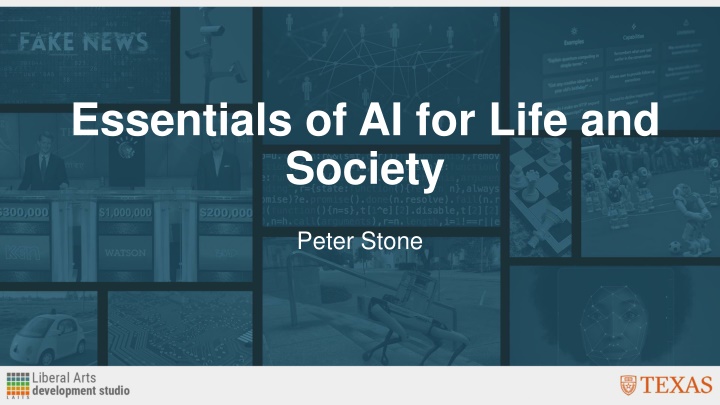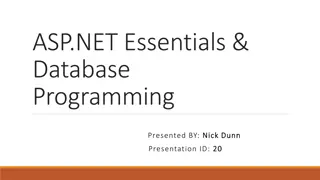Essentials of AI for Life and Society
In this informative text, topics such as probabilistic modeling, defining artificial intelligence, context, agents, randomness vs. patterns, and polls are discussed. Explore the concepts of AI, robotics, agents' goals, AI sensors, and more in an engaging manner.
Download Presentation

Please find below an Image/Link to download the presentation.
The content on the website is provided AS IS for your information and personal use only. It may not be sold, licensed, or shared on other websites without obtaining consent from the author.If you encounter any issues during the download, it is possible that the publisher has removed the file from their server.
You are allowed to download the files provided on this website for personal or commercial use, subject to the condition that they are used lawfully. All files are the property of their respective owners.
The content on the website is provided AS IS for your information and personal use only. It may not be sold, licensed, or shared on other websites without obtaining consent from the author.
E N D
Presentation Transcript
Essentials of AI for Life and Society Peter Stone
Defining Artificial Intelligence A science and a set of computational technologies that are inspired by, but typically operate quite differently from, the ways people use their nervous systems and bodies to sense, learn, reason, and take action NOT one thing More than just deep learning RL, NLP, vision, planning, symbolic reasoning, algorithmic game theory, computational social choice, human computation Getting Computers to do the things they can't do yet Once it works, it's engineering
Some Context Logic, planning, and search dominated the early days They were found to be brittle Abdulmalik: How [do] randomness and probability relate to ... Artificial intelligence? Probabilistic modeling was introduced to deal with reasoning
Agents (and robots) Evelyn: What do they mean by agents? Dakshin: When an agent is made, who determines the relative importance of the various goals it has to achieve? Tatianna: Can you talk more about AI sensors? In the example that was used for this topic, it states that robots can tell whether a door in front of it is by using its sensors and probability. What about the robots that don't have a map of the room or building? How do they know that they are in front of a door? Do they just keep running into things until they find it or is there a way that it can sense where exactly it is at?
Randomness vs. Patterns Kelsey: How can you be sure that the random choice will yield more favorable results than sticking to a pattern? I think we find ourselves looking for patterns because it's better than blindly guessing, even if both options lead to similar outcomes. Embrace the random. Find the pattern. Know the difference.
Poll Poll "Our understanding of "Our understanding of probability comes mostly probability comes mostly from: from: - - Innate ability Innate ability - - Learning and experiences Learning and experiences
Rational Agents Rodrigo: I wonder if AI will ever develop an innate sense of predicting probability without using math but with feelings. Michael: I think AI models need to have a fundamentally different architecture to attain innate senses. In a way, this is just what we call feelings , or gut instinct . Right now the current models rely heavily on probabilities to make the most probable prediction. There is no override option that ignores the numbers and goes off of feeling . William: I think that [AI] agents acting with rationality is very important for their implication in real life having a robot act rationally would help these agents act in the most efficient and beneficial way for their operation. Corvion: I see this being an advantage of AI as it doesn't have bias towards patterns like humans do. Should AI agents always be built to be fully rational (make decisions based on probabilities of outcomes)? Or are there situations in which it would useful for them to model making decisions based on feelings? Discuss!
Value of Human Life Keenan: Is it possible to assign a monetary value to a human life in ethical dilemmas? VSL = value of statistical life Value society will pay to reduce risk of death $10 million in high-income contries QALY = quality-adjusted life years (average of $250k/yr) Micromort = 1 in 1 million chance of dying ($10)
Modeling Humans Sherwin: One question that I had was how we can incorporate human logic into probability, to understand how likely a human will be to actually make a decision. Understanding human thought and process can help create proper planning and pathing for robots. Tatianna: How can we create AI that mimics the complexity of human behavior, given our limited understanding of ourselves?
Correlation vs. Causation Neil: Cause and effect can be difficult to ascertain Recall the example of people eating ice cream when they are sunburnt Why is it useful to understand whether eating ice cream causes sun burns (or vice versa)? How can an AI agent (or a person) tell whether that s the case? Discuss!
Societal Implications Mahika: This is what makes probability and determining whether AI is actually good for society or not difficult. The chances of robots going rogue or having technical malfunctions are slim, but the chance still exists so we must take it into consideration. Carly: As Professor Fleischmann mentioned, AI uses a lot of computing power and therefore requires a lot of electricity to run server farms. With climate change and global warming at the forefront of the world's issues, we need to be mindful of the ways we are using this technology and where we are sourcing this energy.
Poll Poll "How central should AI "How central should AI guidelines be? guidelines be? - - State State- -level guidelines level guidelines - - Country Country- -level guidelines level guidelines - - Worldwide guidelines Worldwide guidelines
Global Ethics Guidelines Ahmed: ...the complexity of AI ethics. It's not [just] about the technology but about cultural and social aspects too. I'm curious about how developers deal with dilemmas when different parts of the world have conflicting perspectives on topics such as surveillance and privacy. Is it feasible to create a universally ethical AI when cultural values vary significantly across the globe? If so, how? If not, what should we do about it? Discuss!
Poll Poll " Which ethical principle should take " Which ethical principle should take precedence in AI development? precedence in AI development? - - Non Non- -maleficence (preventing harm) maleficence (preventing harm) - - Justice and fairness (ensuring equitable Justice and fairness (ensuring equitable treatment) treatment)
Next Week: Computer Vision Register to vote! 2 Readings Lecture by Kristen Grauman Homework 2 due Friday, Homework 3 due 10/11 Do readings on perusall and submit ethics reflection!























